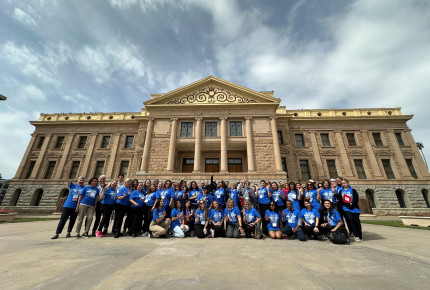 PHOENIX, ARIZ. – MARCH 14, 2024 – Cancer survivors, patients, and caregivers from across Arizona convened at the State Capitol Thursday for ‘Cancer Action Day,’ an event hosted annually by the American Cancer Society Cancer Action Network (ACS CAN). Donning bright blue shirts, volunteers met with several state lawmakers and urged them to support policies that would aid in the fight against cancer.
PHOENIX, ARIZ. – MARCH 14, 2024 – Cancer survivors, patients, and caregivers from across Arizona convened at the State Capitol Thursday for ‘Cancer Action Day,’ an event hosted annually by the American Cancer Society Cancer Action Network (ACS CAN). Donning bright blue shirts, volunteers met with several state lawmakers and urged them to support policies that would aid in the fight against cancer.
Volunteers asked lawmakers to ensure funding for lifesaving cancer screening programs, like the ‘Well Woman Health Check.’ The state program provides free breast and cervical cancer screenings for low-income uninsured and underinsured women. Governor Katie Hobbs is requesting more than $1.36 million dollars to continue the program. According to the American Cancer Society, breast cancer is expected to be the leading cancer diagnosis for Arizona women in 2024. While death rates from breast cancer have been declining, not all people have benefitted equally from advances in prevention, early detection, and treatment.
“Early detection really enhances your breast cancer survival,” said Maria Martinez, breast cancer survivor, retired nurse, and Tucson resident. “It’s very important to catch the cancer early before it metastasizes. Breast cancer treatment has come a long way and that’s why it’s important to continue the surveillance. I’m here today to ask Arizona lawmakers to help us achieve our goal of giving more women access to early detection.”
Volunteers also asked lawmakers to support several other policies including SB 1164 which, if enacted, would prevent health insurers from making changes to prescription drug formularies during the plan year, including removing drugs from coverage or increasing cost sharing. Survivors and patients urged legislators to reduce the toll tobacco is having on Arizonans, as well by supporting and enacting prevention policies that help people who use tobacco products to quit and deter kids from ever using such products.
‘Cancer Action Day’ is timely because cases are projected to rise in Arizona this year compared to last. Lung and colorectal cancers are expected to be the deadliest in the state. As noted in a recent study, colorectal cancer is now a leading cause of cancer death in men and women under age 50. However, the study also noted cancer mortality continues its 30-year decline leading to 4.1 million lives being saved across the United States.
 PHOENIX, ARIZ. – MARCH 14, 2024 – Cancer survivors, patients, and caregivers from across Arizona convened at the State Capitol Thursday for ‘Cancer Action Day,’ an event hosted annually by the American Cancer Society Cancer Action Network (ACS CAN). Donning bright blue shirts, volunteers met with several state lawmakers and urged them to support policies that would aid in the fight against cancer.
PHOENIX, ARIZ. – MARCH 14, 2024 – Cancer survivors, patients, and caregivers from across Arizona convened at the State Capitol Thursday for ‘Cancer Action Day,’ an event hosted annually by the American Cancer Society Cancer Action Network (ACS CAN). Donning bright blue shirts, volunteers met with several state lawmakers and urged them to support policies that would aid in the fight against cancer.